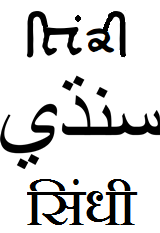Language/Sindhi/Grammar/Future-Tense
Hi Sindhi learners! 😊
In this lesson, we will learn about the future tense in Sindhi grammar. We will also explore the culture and interesting facts related to Sindhi language. Sindhi is the official language of Pakistan and is spoken by millions of people around the world. Sindhi is also one of the oldest languages known in the world, with a rich literary history. Sindhi is a versatile language that has been influenced by Sanskrit, Persian, and Arabic.
Before we dive into the future tense, let's quickly revise the present tense. In the present tense, we add the suffix -يندا to the verb base. For example:
Take some time to dive into these other pages after completing this lesson: Give your Opinion & Conditional Mood.
| Sindhi | Pronunciation | English |
|---|---|---|
| ڪتاب پڙهيندا آهي | Kutab parhinnda aahi | He is reading a book. |
Now that we have revised the present tense, let's move onto the future tense.
Formation of the Future Tense[edit | edit source]
To form the future tense, we add the suffix -ڻو to the verb base. For example:
| Sindhi | Pronunciation | English |
|---|---|---|
| ڪتاب پڙهيڻو آهي | Kutab parhinnavo aahi | He will read a book. |
Let's take another example:
| Sindhi | Pronunciation | English |
|---|---|---|
| آئيون ٻڌيڻو | AiyouN bhaDdhiNvo | I will come tomorrow. |
Here, we can see that we add the suffix -ڻو to the verb base. The subject pronoun can be added before the verb if needed. For example, if we want to say 'I will read a book', we can say:
| Sindhi | Pronunciation | English |
|---|---|---|
| منهنجون ڪتاب پڙهيڻو آهي | MenuNjoN kutab parhinnavo aahi | I will read a book. |
More Examples[edit | edit source]
Here are some more examples to help you understand the future tense better:
| Sindhi | Pronunciation | English |
|---|---|---|
| توهان جا پئيندو سوال جواب ڏيندو آهن | Tuhin ja paiyndo sawaal javaab dindho aaheN | You will answer the question. |
| هن جي ورثو ڪثير زرع ڪرين ٿو | Hen ji waritho kaseer zar'a kareen tho | They will cultivate a lot of land. |
Usage[edit | edit source]
The future tense is used in situations where we need to talk about events that will happen in the future. The future tense can be used to talk about intentions, plans, and predictions. The future tense is often used with time expressions such as 'tomorrow', 'next month', 'next year' etc.
Culture and Interesting Facts[edit | edit source]
Sindhi language has a rich cultural heritage. In Sindhi literature, we can find the works of famous poets like Shah Abdul Latif Bhittai, Sachal Sarmast, and Sheikh Ayaz. Sindhi music is also popular around the world, with famous singers like Abida Parveen, Allan Faqir, and Shazia Khushk.
Sindhi is a language that is spoken in many parts of the world. Sindhi people have a rich and vibrant culture. The traditional dress of Sindhi people is called 'Sindhi Topi' which is a cap made of different fabrics like Ajrak and Shikarpuri. Sindhi cuisine is also famous for its unique taste and recipes such as Sindhi biryani, Sai bhaji, and Sindhi kadhi.
To improve your Sindhi Grammar, you can also use the Polyglot Club website. Find native speakers and ask them any questions!
Dialogue[edit | edit source]
Let's see a dialogue between two people in Sindhi.
- Person 1: ڪيا توهان هيٺ سگهڻو آهيو؟ (Kaya tuhan hith suggandho aahio?) - Are you going to the market?
- Person 2: اڏهن فرمايان شو شايد (AdhaN firmaayaN sho shaayad) - Maybe I will go there.
Sources[edit | edit source]
- Future tense of ToBe - English Sindhi Grammar - SindhiTutorials
- Sindhi Grammar - Future Tense
- Future simple tense - English Sindhi Grammar - SindhiTutorials
➡ If you have any questions, please ask them in the comments section below.
➡ Feel free to edit this wiki page if you think it can be improved. 😎
Videos[edit | edit source]
Future perfect tense in sindhi | part 11| future perfect tense - YouTube[edit | edit source]
Future indefinite tense in Sindhi || future simple tense || class 11 ...[edit | edit source]
Future indefinite tense in Sindhi | part 9 | future indefinite - YouTube[edit | edit source]
Other Lessons[edit | edit source]
- Plurals
- Give your Opinion
- Negation
- Questions
- How to Use Have
- Pronouns
- How to Use Be
- Conditional Mood
- Adjectives

